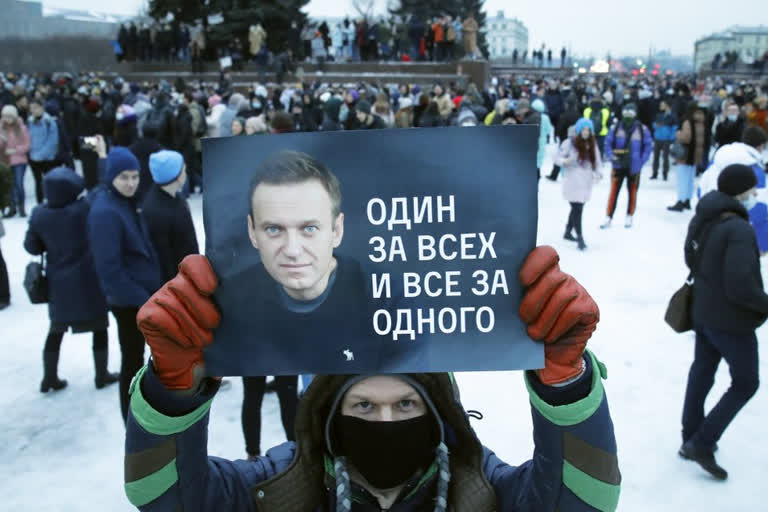Moscow:Allies of jailed Russian opposition leader Alexei Navalny, who faces years in prison, called for new protests next weekend to demand his release, following a wave of demonstrations that turned out tens of thousands across the country in a defiant challenge to President Vladimir Putin.
Mass rallies took place Saturday in over 100 cities in what observers said was the largest outpouring of anger in years, and Navalny’s supporters urged protesters to keep up the pressure.
Navalny strategist Leonid Volkov tweeted Monday for more demonstrations on Jan. 31 in “all Russian cities. ... For Navalny’s freedom. For our freedom. For justice.”
Some of those detained were released without charges, but many others faced court hearings. In Moscow, courts have handed jail terms ranging from seven to 15 days to at least 30 detainees and fined 64 others.
Authorities also launched more than a dozen criminal investigations in Moscow, St. Petersburg and other Russian cities on charges of inciting unrest, involving minors in illegal activity, violence against police, blocking roads, hooliganism and damaging property. Navalny’s team said Russia’s Investigative Committee also is probing violations of virus-related restrictions.
Dozens of Navalny associates in various cities were detained in the days before the protests. Alexander Peredruk, a senior partner of the Apologia of Protest legal aid group involved in the defence of over 1,000 detainees from the Saturday protests, called the authorities’ response “unprecedented.”
Read:|Russia arrests 350 protesters demanding Navalny’s release
Navalny, an anti-corruption campaigner and Putin’s fiercest critic, was arrested Jan. 17 as he returned to Russia from Germany, where he had spent nearly five months recovering from nerve-agent poisoning that he blames on the Kremlin. Russian authorities deny the accusations.
He was ordered jailed for 30 days but faces years in prison, with authorities accusing him of violating the terms of a suspended sentence in a 2014 conviction for financial misdeeds. Navalny has said the conviction was politically motivated.
Navalny’s arrest and the detention of demonstrators sparked outrage both at home and abroad, and some Western officials suggested imposing additional sanctions on Russia for its jailing of Navalny.
White House press secretary Jen Psaki urged the immediate and unconditional release of Navalny, as well as those who were detained in the crackdown. Psaki did not say when President Joe Biden plans to speak to Putin.
Biden was asked if he would put sanctions on the people involved in the poisoning and arrest of Navalny and what that means for prospects of the extension of the New START nuclear arms treaty with Russia.
“I find that we can both operate in the mutual self-interest of our countries as a New START agreement and make it clear to Russia that we are very concerned about their behaviour,” he said, whether it involved Navalny or some other issue.
